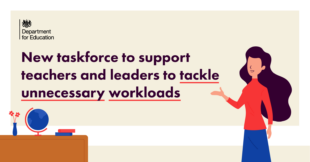
We want to make sure that teaching is an attractive career choice, which is why we’re committed to tackling unnecessary workload for teachers and leaders. Our ambition is to reduce working hours by five hours per week within three years and to support this, we’ve launched the Workload Reduction Taskforce.
The Taskforce will make recommendations to help teachers focus on activities that provide the biggest impact on pupil outcomes. Its launch comes after a 6.5% pay award for teachers and leaders for the academic year 2023/24.
Here, we explain everything you need to know.
What is the Workload Reduction Taskforce and what will it do?
The Taskforce is made up of education experts, from those working in our classrooms, to those in management positions. It includes representatives from all four teaching unions (NEU, NAHT, NASUWT and ASCL), as well as teachers, leaders and academics.
Drawing on insight and experience from across the education sector, the group has developed a series of initial recommendations to reduce unnecessary teacher and leader workload. The recommendations are available to view here. Final recommendations will be published in spring 2024.
How are you improving teacher wellbeing?
We’re providing an additional £1.5 million in mental health and wellbeing support for leaders, providing professional supervision and counselling to at least 2,500 school and college leaders.
This builds on the existing mental health and wellbeing programme, delivered by the charity Education Support – over 1,400 leaders have benefitted so far.
Since its publication two years ago, over 3000 schools and colleges have also adopted the Education Staff Wellbeing Charter. The Charter is a resource for schools and colleges to help create and publicly commit to their own staff wellbeing strategy. We have made significant progress on our pledges in the charter (see our progress update).
We’re also working with the sector on guidance for schools on how to prevent and tackle bullying and harassment of staff, due to be published later this year.
Are you also supporting flexible working for teachers?
School leaders are also receiving support to introduce flexible working in their schools.
A new toolkit has now been launched, with practical resources to help them introduce practices such as job shares, part-time working and ad-hoc flexibility, such as the occasional personal day.
As part of this, a further five new Flexible Working Ambassador Multi-Academy Trusts and Schools (FWAMS) have been announced, on top of the seven announced in June this year. The FWAMS will champion flexible working and offer practical advice to school leaders.
What else are you doing to improve recruitment and retention of teachers?
Since 2010, we have recruited 27,000 more teachers in England.
Last year, the government accepted the independent pay review body’s recommendations for the 2023/24 teacher pay award. In September, school teachers in England received a pay award of 6.5% – the highest pay award for teachers in over 30 years. On top of this, we’ve boosted starting salaries for new teachers to at least £30,000 across the country.
To make sure we’re attracting the best and brightest educators, in some key subjects we offer tax free bursaries worth up to £27,000 and scholarships worth up to £29,000. We provide funding for programmes to boost subject knowledge, and we are developing a new physics Initial Teacher Training course for engineers.
We’re also encouraging former teachers to rejoin the profession through the Return to Teaching Advisory service – read more about this initiative here.
Since our launch of the Teacher Recruitment and Retention Strategy nearly five years ago, we’ve worked to develop access high-quality training and support for teachers at every stage of their career.
In 2024, we will publish a strategy update that builds upon a commitment to give every child a world class education delivered by great teachers. This will set out priorities for the coming years and provide an update on progress made so far.